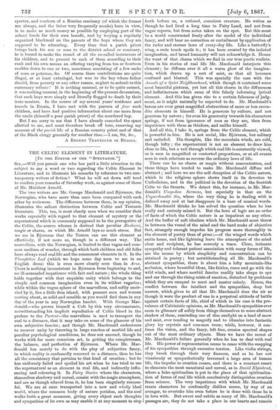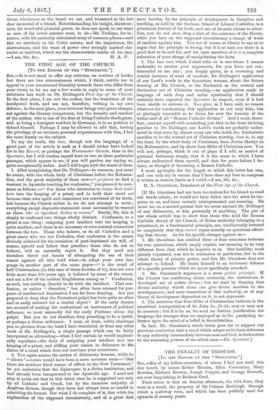THE CELTIC ELEMENT IN LITERATURE. [To THE EDITOR OF THE
4 4 SPECTATOR."] SIR,-.Will you permit one who has paid a little attention to the subject to say a word or two regarding the Celtic Element in Literature, and to illustrate his remarks by reference to two con- temporary writers of fiction? What he will set down will tend to confirm your remarks of Saturday week, as against some of those of Mr. Matthew Arnold.
The two writers are Mr. George Macdonald and Bjornson, the Norwegian, who have more than once been compared with each other by reviewers. The difference between them, in my opinion, illustrates the salient distinction between Celtic and Teutonic literature. This, too, is most clearly seen when we consider their works especially with regard to that element of mystery or the supernatural which is commonly supposed to be the prerogative of the Celtic, the source whence is derived that peculiar Zauberei, magic or charm, on which Mr. Arnold lays so much stress. But we see in Bjornson that the Teuton can use this element as effectively, if not more so, though in a different way. The marvellous, with the Norwegian, is limited to that vague and com- mon medium of wonder, through which both children and old folks have always read real life and the commonest elements in it. In the Thoughtless Lad (which we hope some day soon to see in an English dress) this is even more clearly seen than in Arne. There is nothing inconsistent in Bjornson from beginning to end, no ill-concealed impatience with fact and nature ; the whole thing holds together with that exquisite unity which belongs to the simple and common imagination even in its wildest vagaries ; while within the vague sphere of the marvellous, and softly encir- cled by it, lies a little firm island, with peasant men and women moving about, as solid and sensible as you would find them in any day of the year in any Norwegian hamlet. With George Mac- donald—who proves himself a Celt by this very circumstance, notwithstanding his implicit repudiation of Celtic blood in the preface to the Portent—the marvellous is used to transport the real to a distance, that it may take on some of the glamour of his own subjective fancies ; and though Mr. Macdonald endeavours to recover unity by throwing in large reaches of morbid life and peculiar psychological conditions, he does not succeed, though he works with far more conscious art, in getting the completeness, the balance, and perfection of Bjornson. Where Mr. Mac- donald has merely to do with the play of subjective fancy, in which reality is confessedly removed to a distance, then he has all the consistency that pertains to that kind of creation ; but he has uniformly failed and spoiled his art when he has tried to use the supernatural as an element in real life, and indirectly influ- encing and colouring it. In Fairy Stories where the characters, themselves shadowy and unreal, consist with the magic atmosphere, and are as though educed from it, he has been singularly success- ful. We are at once transported into a new and wholly ideal world, where the common body of nature perishes, and the soul walks forth a great mummer, giving every object such thoughts and sympathies of its own as may enable it at any moment to step forth before us, a rational, conscious creature. He writes as though he had lived a long time in Fairy land, and not from vague reports, but from notes taken on the spot. But this must be a world constructed freely after the model of the individual fancy, and will bear no correction or curtailment by application of the ruder and sterner laws of every-day life. Like a butterfly's wing, a rude touch spoils it; it has been created by the isolated imagination, and broad humanity will not acknowledge it. Hence the want of that charm which we find in our true poetic realists. Even in his stories of real life Mr. Macdonald interjects this element ; he diffuses over it all a warm glow of the imagina- tion, which draws up a sort of mist, so that all becomes confused and blurred. This was specially the case with the Annals of a Quiet Neighbourhood, which though it contained some most beautiful pictures, yet lost all this charm in the diffuseness and indistinctness which came of this falsely informing lyrical element. And this has given rise to a certain falseness of judg- ment, as it might naturally be expected to do. Mr. Macdonald's heroes are ever great magnified abstractions of more or less recon- dite elements in himself. He is generous by culture, and not generous by nature ; for even his generosity towards his characters springs, if not from ignorance of men as they are, then from impatience with them as thinkers, and unlike himself.
And all this, I take it, springs from the Celtic element, which is powerful in him. He is not social, like Bjornson, but solitary and secluded. His thoughts, like the mountain winds, are cold, though lofty ; the supernatural is not an element to draw him close to life, but a veil through which real life is constantly viewed, or is seen in magnified or contorted proportions, or at all events seen in such relations as reverse the ordinary laws of life.
There can be no charm or magic without concentration, and these things have tended to make Mr. Macdonald diffuse and abstract ; and here we see the self-deception of the Celtic nature, which in the religious sphere shows itself in its devotion to Catholicism, and in the political in the devotion of the Scottish Celts to the Stuarts. We detect this, for instance, in Mr. Mac- donald's Unspoken Sermons, but especially in that on the Unpardonable Sin, where the very thing he is dealing with is defined away and at last disappears in a haze of musical words. Mr. Macdonald thinks he has solved the question when he has really and entirely missed it. But the laws of logic are an order of facts of which the Celtic nature is as impatient as any other. And the buffer of soft idealism which Mr. Macdonald must throw in between the vessel of the mind and the hard rocks of objective fact, strangely enough impedes his progress more thoroughly in the element of poetry than of prose ;—of the winged words which smite home, and like lightning leave the atmosphere of the mind clear and recipient, he has scarcely a trace. Close, intimate sympathy and tolerant patient association with many forms of life, are the means by which simplicity and concentration can be attained in poetry ; but notwithstanding all Mr. Macdonald's abstract sympathies, there is about him a lofty mountain-like seclusion, where beautiful ideas, like fairies, come and go with the wild winds, and where morbid fancies readily take shape to eye and ear through the rising mists of emotion, disturbed by problems which they are unequal to meet and master calmly. Hence, the conflict between the intellect and the sympathies, deep but narrow, which gives to all that Mr. Macdonald does the air as though it were the product of one in a perpetual attitude of battle against certain facts of life, chief of which in his case is the pre- valence of Calvinistic opinions, as Mr. Macdonald's sympathies ever seem to glimmer off softly from things themselves to some abstract shadow of them, reminding one of dim sunlight on a land of snow and mist, ever tending to magnify and to illumine into fantastic glory icy crystals and common trees; while, however, it con- fuses the vision, and the fancy, left free, creates spectral shapes out of the most ordinary objects. Here we have the secret of Mr. Macdonald's failure generally when he has to deal with real life. His power of representation seems to cease with the snapping of his sympathies through excessive tension. Like violin strings, they break through their very fineness, and as he has not vicariously or sympathetically traversed a large area of human life, the impulse to creation ceases, and there is a constant resort to elements the most unnatural and unreal, as in David Elginbrod, where a false spiritualism is put in the place of that spiritualiza- tion of forms of real life which conclusively distinguishes creation from science. The very impatience with which Mr. Macdonald treats characters he confessedly dislikes seems, by way of an avenger, to overtake him even before he is done with those be is in love with. But sweet and subtle as many of Mr. Macdonald's passages are, they do not take a place in our hearts and remain there, wholesome as the bread we eat, and treasured as the last dear memorial of a friend. Notwithstanding his insight, his sweet- ness, his wonderful pictorial power, he does not speak to our want as men of far lower natures seem to do—Mr. Trollope, for in- stance, with his patiently elaborated array of common-places—and this we attribute to his Celtic nature, and the impatience, the abstractness, and the want of power over strongly marked cha- racter or incident, which are the characteristic marks of his race.































 Previous page
Previous page